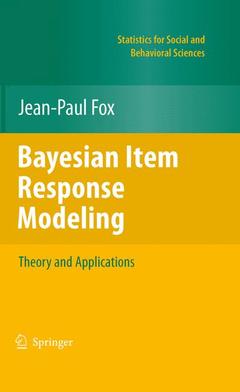Description
Bayesian Item Response Modeling, 2010
Theory and Applications
Statistics for Social and Behavioral Sciences Series
Author: Fox Jean-Paul
Language: English
Subjects for Bayesian Item Response Modeling:
Bayesian Item Response Modeling
Publication date: 09-2012
313 p. · 15.5x23.5 cm · Paperback
Publication date: 09-2012
313 p. · 15.5x23.5 cm · Paperback
Bayesian item response modeling. Theory and applications (Statistics for social and behavioral sciences)
Publication date: 06-2010
313 p. · 15.5x23.5 cm · Hardback
Publication date: 06-2010
313 p. · 15.5x23.5 cm · Hardback
Description
/li>Contents
/li>Biography
/li>Comment
/li>
The modeling of item response data is governed by item response theory, also referred to as modern test theory. The eld of inquiry of item response theory has become very large and shows the enormous progress that has been made. The mainstream literature is focused on frequentist statistical methods for - timating model parameters and evaluating model t. However, the Bayesian methodology has shown great potential, particularly for making further - provements in the statistical modeling process. The Bayesian approach has two important features that make it attractive for modeling item response data. First, it enables the possibility of incorpor- ing nondata information beyond the observed responses into the analysis. The Bayesian methodology is also very clear about how additional information can be used. Second, the Bayesian approach comes with powerful simulation-based estimation methods. These methods make it possible to handle all kinds of priors and data-generating models. One of my motives for writing this book is to give an introduction to the Bayesian methodology for modeling and analyzing item response data. A Bayesian counterpart is presented to the many popular item response theory books (e.g., Baker and Kim 2004; De Boeck and Wilson, 2004; Hambleton and Swaminathan, 1985; van der Linden and Hambleton, 1997) that are mainly or completely focused on frequentist methods. The usefulness of the Bayesian methodology is illustrated by discussing and applying a range of Bayesian item response models.
to Bayesian Response Modeling.- Bayesian Hierarchical Response Modeling.- Basic Elements of Bayesian Statistics.- Estimation of Bayesian Item Response Models.- Assessment of Bayesian Item Response Models.- Multilevel Item Response Theory Models.- Random Item Effects Models.- Response Time Item Response Models.- Randomized Item Response Models.
Jean-Paul Fox is Associate Professor of Measurement and Data Analysis, University of Twente, The Netherlands. His main research activities are in several areas of Bayesian response modeling. Dr. Fox has published numerous articles in the areas of Bayesian item response analysis, statistical methods for analyzing multivariate categorical response data, and nonlinear mixed effects models.
Introduces Bayesian item response modeling with examples in a wide array of contexts
Gives a unified treatment of extending traditional item response models to handle more complex assessment data
Computer code and examples facilitate the Bayesian approach to item response modeling
Includes supplementary material: sn.pub/extras
© 2024 LAVOISIER S.A.S.
These books may interest you

Introduction to Bayesian Statistics 140.84 €

Bayesian Psychometric Modeling 56.31 €


